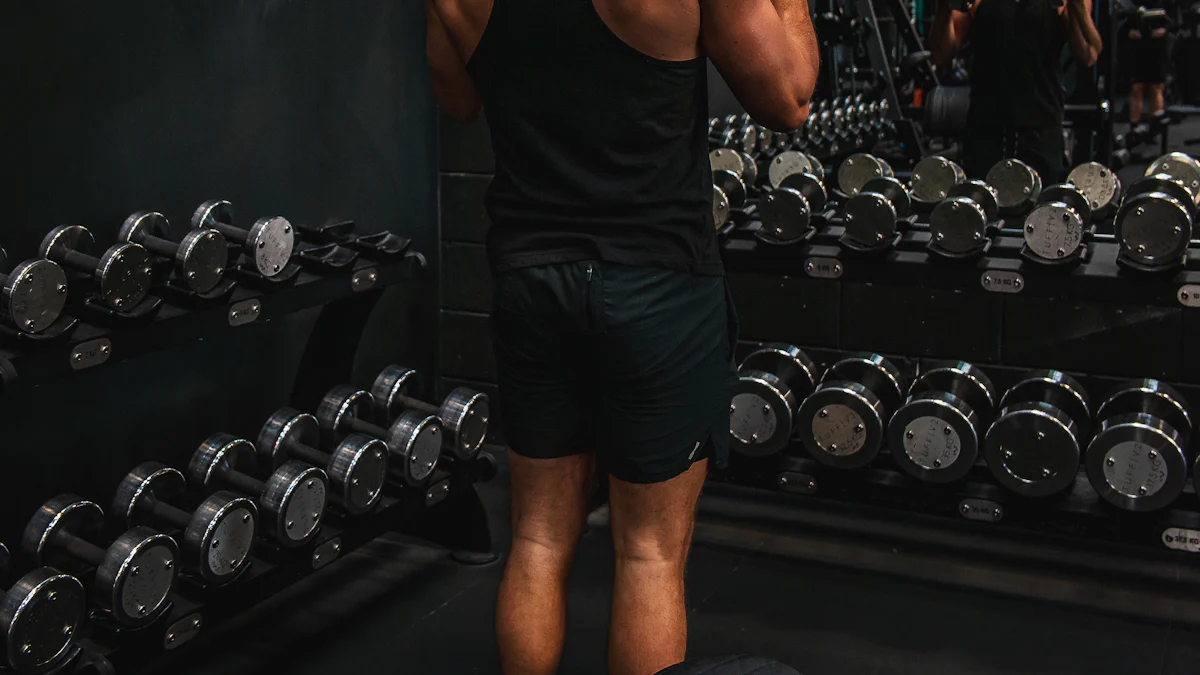Rear Delt Exercise

Shoulder health matters a lot. You need strong shoulders for daily activities and sports. Rear Delt Exercise plays a key role here. The rear delts stabilize your shoulder joint and improve posture. Many people face shoulder issues. About two out of three experience injuries at some point. Strengthening the rear delts can prevent these problems. Exercises like 15 Rear Delt Exercises and Resistance Band Workouts for Men help balance shoulder muscles. Including the Best Plyometric Exercises also boosts overall strength. Focus on these exercises to keep your shoulders healthy and strong.
Understanding the Rear Delts
Anatomy of the Rear Delts
Location and function
The rear deltoids, or posterior deltoids, sit at the back of your shoulder. These muscles connect your shoulder blades to your upper arms. The rear delts help with pulling movements. You engage these muscles when you row a boat or pull a door open. The rear delts also stabilize your shoulders during various activities. This stabilization helps prevent injuries.
Role in shoulder movement
Rear delts play a crucial role in shoulder movement. These muscles assist in lifting your arms out to the sides. They also help rotate your arms externally. This means you use rear delts when you reach for something behind you. Strong rear delts support other muscles in your shoulders and back. This support makes everyday tasks easier and safer.
Importance of Rear Delt Strength
Benefits for posture
Strong rear delts improve your posture. These muscles pull your shoulders back. This action counters the forward hunch many people develop. Better posture reduces strain on your neck and back. You feel more confident when you stand tall. Good posture also helps with breathing. Your lungs expand more fully when your shoulders are aligned properly.
Impact on overall shoulder health
Rear delt strength impacts overall shoulder health significantly. These muscles stabilize your shoulder joints. Stability reduces the risk of injuries during exercises like overhead lifts. Strong rear delts also enhance your performance in sports. You can throw, lift, and push more effectively. Regularly working on rear delts keeps your shoulders healthy and functional.
Effective Rear Delt Exercises

Bent-Over Dumbbell Reverse Fly
Step-by-step instructions
Ready to tackle the Bent-Over Dumbbell Reverse Fly? This Rear Delt Exercise targets the muscles at the back of your shoulders. Start by standing with your feet shoulder-width apart. Hold a dumbbell in each hand. Bend slightly at the hips. Keep your back straight and let your arms hang down. Lift the dumbbells out to the sides until your arms are parallel to the floor. Lower them slowly. Repeat for 10-15 reps. Focus on squeezing your rear delts at the top of the movement.
Common mistakes to avoid
Avoid common pitfalls during this exercise. Many people use too much weight. This shifts focus away from the rear delts. Choose a lighter weight to maintain form. Don't swing the weights. Controlled movements ensure maximum effectiveness. Keep your back straight to prevent strain. Remember, mind-muscle connection is key. As Trainer Bryant suggests, "Keep your mind on the muscles." Focus on your rear delts for the best results.
Face Pulls
Equipment needed
Face Pulls require some equipment. You need a cable machine with a rope attachment. Adjust the pulley to face level. This setup ensures proper alignment for the exercise. If your gym has a rear delt machine, you can swap Face Pulls for rear delt flyes.
Technique and variations
Stand facing the cable machine. Grab the rope with both hands. Step back until the cable is taut. Pull the rope towards your face. Keep your elbows high. Squeeze your shoulder blades together. Return to the starting position slowly. Repeat for 12-15 reps. Variations include using resistance bands. This adds versatility to your Rear Delt Exercise routine. Try different angles to target various parts of the rear delts.
Rear Delt Machine Fly
How to set up the machine
The Rear Delt Machine Fly offers a great way to isolate the rear delts. Adjust the seat height so your arms are level with the handles. Sit with your chest against the pad. Grab the handles with an overhand grip. Ensure the machine's settings match your body size.
Tips for maximizing effectiveness
Focus on slow, controlled movements. Avoid using momentum. Engage your core for stability. Keep your elbows slightly bent. This helps target the rear delts more effectively. Aim for 10-12 reps per set. Consistency is key. Include this in your 15 Rear Delt Exercises routine for balanced shoulder development. Regular practice prevents shoulder injuries and enhances overall strength.
Variations and Modifications
Resistance Band Alternatives
Benefits of using bands
Resistance bands offer a flexible way to work your rear delts. Bands activate muscles differently than weights. This makes them perfect for targeted routines. You can adjust the tension easily. This allows you to customize your workout intensity. Bands are portable. You can use them anywhere, making them ideal for home workouts or travel. Many men find Resistance Band Workouts for Men effective for building strength and endurance.
How to perform band exercises
Start with a simple rear delt pull. Anchor the band at chest height. Stand facing the anchor point. Hold the band with both hands. Pull the band towards your face, keeping elbows high. Squeeze your shoulder blades together. Return slowly to the starting position. Repeat for 12-15 reps. Try lateral raises with bands. Stand on the band. Hold the ends in each hand. Lift your arms out to the sides. Keep them parallel to the floor. Resistance Band Workouts for Men can include these variations for a comprehensive routine.
Bodyweight Options
Exercises without equipment
Bodyweight exercises offer great options for rear delt training. You don't need any equipment. Start with reverse planks. Sit on the floor with legs extended. Place hands behind you. Lift your hips off the ground. Hold this position. Focus on engaging your rear delts. Another option is prone Y raises. Lie face down. Extend your arms overhead in a Y shape. Lift your arms slightly off the ground. Hold for a few seconds. Lower them back down. These exercises fit well into Resistance Band Workouts for Men.
Suitable for beginners
Bodyweight exercises suit beginners perfectly. You can start with basic movements. Gradually increase intensity as you gain strength. Focus on form and control. This helps prevent injuries. Beginners often find Resistance Band Workouts for Men helpful. These workouts provide a balanced approach to building rear delt strength. You can mix bodyweight exercises with band routines for variety. This keeps your workouts engaging and effective.
FAQs on Rear Delt Exercises
How often should I train rear delts?
Recommended frequency
You might wonder how often to work those rear delts. Aim for two to three times a week. This frequency helps build balanced shoulders. Consistent training improves stability and strength. Each session should include a variety of exercises. Mix things up to keep muscles engaged.
Signs of overtraining
Watch out for signs of overtraining. Feeling constant fatigue or soreness? That could mean you're pushing too hard. Listen to your body. Rest is crucial for muscle recovery. Overtraining can lead to injuries. Keep workouts effective by allowing time for recovery.
Can rear delt exercises prevent shoulder injuries?
Preventative benefits
Rear delt exercises play a big role in preventing shoulder injuries. Strong rear delts stabilize the shoulder joint. This stability reduces the risk of strains and sprains. Regular exercises improve posture. Better posture means less stress on the neck and back.
Additional tips for shoulder health
Want to keep your shoulders healthy? Include a variety of exercises in your routine. Focus on proper form and technique. Warm up before workouts to prepare muscles. Cooling down helps prevent stiffness. Stay consistent and listen to your body. Healthy shoulders support an active lifestyle.
Rear delt exercises hold immense value for your shoulder health. Strong rear delts enhance your posture and prevent injuries. You should make these exercises a staple in your workout routine. Regular practice can lead to balanced shoulder strength and improved appearance. Remember, consistent effort pays off. Healthy shoulders support an active lifestyle and boost confidence. Keep focusing on your rear delts to enjoy the benefits of a strong and stable upper body.
